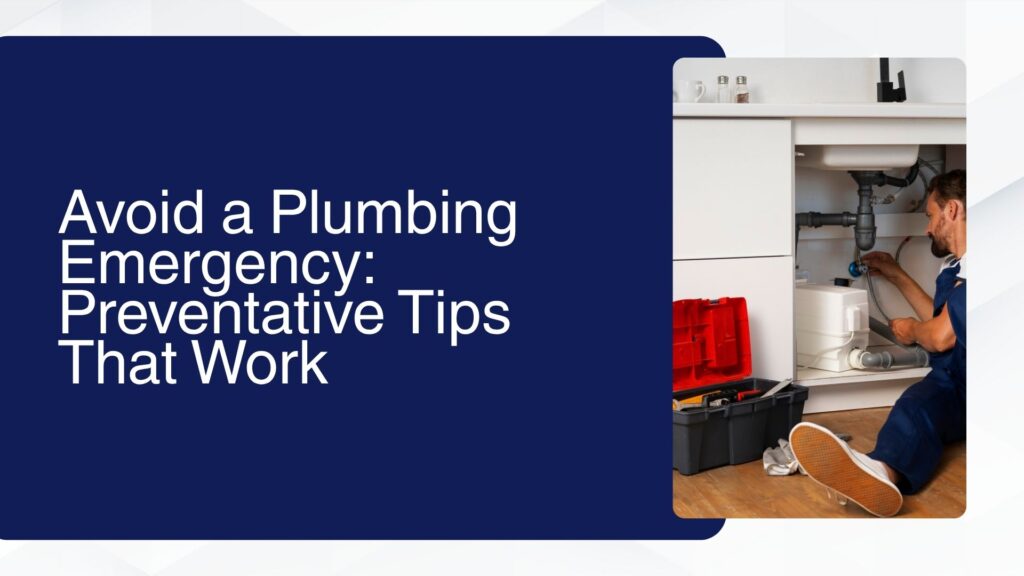When it comes to home maintenance, plumbing is one area you can’t afford to ignore. A small leak, slow drain, or dripping faucet might seem harmless today—but it could turn into a major plumbing emergency tomorrow. The good news? Most plumbing disasters are preventable with proper care and early intervention.
Whether you own a cozy home or manage a commercial property, following a few key maintenance practices can help you avoid costly repairs and unexpected breakdowns. Here’s how to protect your plumbing system and keep everything flowing smoothly.
1. Watch What Goes Down the Drain
Clogged drains are among the most common plumbing issues. Grease, hair, soap scum, and debris gradually build up, restricting water flow and leading to slow or completely blocked drains.
To prevent this, never pour grease or oil down your kitchen sink, and use drain strainers in bathroom sinks and showers to catch hair and soap residue.
If your drains are already running slow or emitting foul odors, don’t wait until the problem gets worse—schedule a professional drain cleaning service. Experts use advanced tools to clear stubborn blockages and restore proper flow, preventing backups that could flood your home.
2. Inspect Your Plumbing Regularly
Many homeowners only call a plumber when something breaks—but routine inspections can catch problems early. A certified plumber can check for small leaks, corrosion, and early signs of damage before they escalate.
For homeowners, scheduling annual general plumbing repair or maintenance visits can save hundreds (or even thousands) in future repairs. It’s much easier—and cheaper—to replace a worn-out washer than deal with a burst pipe that ruins your walls or flooring.
3. Maintain Your Water Heater
Your water heater works hard every day, providing hot water for showers, laundry, and dishwashing. Over time, sediment buildup can reduce efficiency and shorten its lifespan.
If you notice inconsistent water temperature or strange noises, it might be time for water heater replacement or service. Alternatively, you can upgrade to a tankless water heater—a more energy-efficient system that provides endless hot water while reducing long-term maintenance costs.
4. Test and Soften Your Water
Hard water can silently wreak havoc on your plumbing system. The minerals in hard water cause scale buildup in pipes, reduce appliance efficiency, and shorten the lifespan of fixtures like faucets and water heaters.
Installing a water softener system not only protects your pipes but also helps you save on energy bills, as your appliances work more efficiently. Plus, soft water is gentler on your skin, clothes, and dishes—making it a win-win for your household.
5. Don’t Ignore Sewer Line Issues
A hidden sewer problem can cause messy, expensive, and health-threatening issues if ignored. Slow drains throughout the home, gurgling toilets, or unpleasant odors could indicate a blockage or damaged line.
Scheduling professional sewer repair services early can prevent backups and extensive property damage. Plumbers can perform video inspections to pinpoint the exact problem and recommend cost-effective solutions—before a full-blown sewer emergency strikes.
6. Care for Your Septic System
If your home relies on a septic system, maintenance is crucial. Ignoring it can lead to backups, leaks, or even ground contamination. Regular pumping and inspection help maintain balance and prevent costly repairs.
Contact experts for routine septic services to keep your system in peak condition and ensure your property remains safe and sanitary.
7. Prepare for Seasonal Changes
Temperature fluctuations can stress your plumbing system, especially during colder months. Frozen pipes are one of the most common causes of winter plumbing emergencies. To prevent this, insulate exposed pipes, especially those in basements, attics, and exterior walls.
During the rainy season, make sure gutters and drains are clear to prevent water from pooling near your foundation. Regular inspections from professionals who specialize in residential plumbing can help safeguard your system year-round.
8. Schedule Regular Maintenance for Commercial Properties
For business owners, plumbing issues can disrupt operations and lead to costly downtime. Leaks, blocked drains, or gas line issues in a commercial building require immediate attention and proactive care.
Partnering with a professional commercial plumbing service ensures your system is regularly inspected and maintained. This helps prevent emergencies that could shut down your business or damage your reputation.
9. Check Your Gas Lines
Gas leaks are one of the most dangerous plumbing emergencies—and they’re more common than most homeowners realize. If you smell gas or suspect a leak, evacuate immediately and call a professional for inspection.
Preventive maintenance through gas plumbing services ensures your lines are secure, your appliances are working efficiently, and your family stays safe.
10. Don’t Wait for Problems to Escalate
Many plumbing emergencies begin as minor annoyances—like a dripping faucet or a slow-draining sink. Ignoring these early warning signs gives them time to worsen. The moment you notice anything unusual, call a licensed plumber to assess and fix the issue.
Whether it’s drain cleaning, sewer repair, or general plumbing repair, addressing problems early will always be more affordable and less stressful than dealing with a full-blown emergency.
Final Thoughts
Preventing plumbing emergencies starts with awareness and consistency. Simple habits—like watching what you flush, scheduling regular maintenance, and upgrading aging fixtures—go a long way toward protecting your home and saving money.
At Chad’s Water Works, we specialize in comprehensive plumbing solutions for both residential and commercial properties. From water heater replacement to tankless installations, sewer repair, and septic maintenance—our licensed team provides the expert care your plumbing deserves.
Don’t wait for an emergency to strike. Schedule your plumbing inspection today and enjoy peace of mind knowing your home is protected from the ground up.

